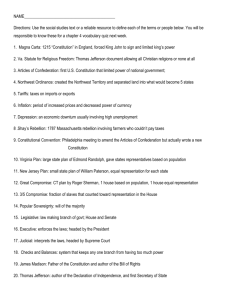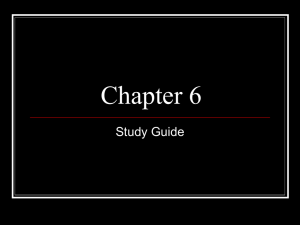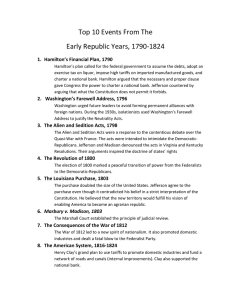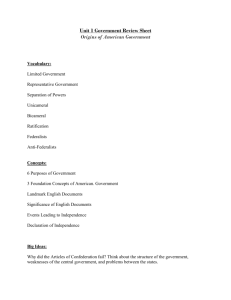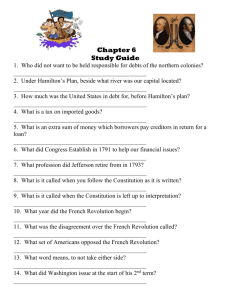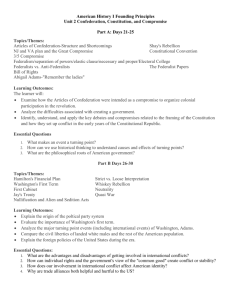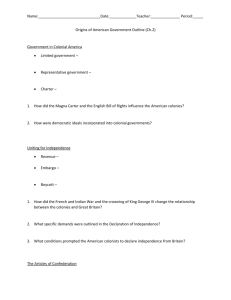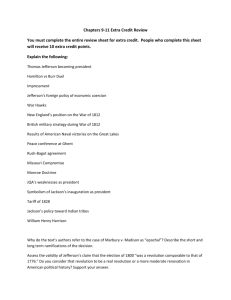1301-Review Sheet for Midterm 2.doc
advertisement
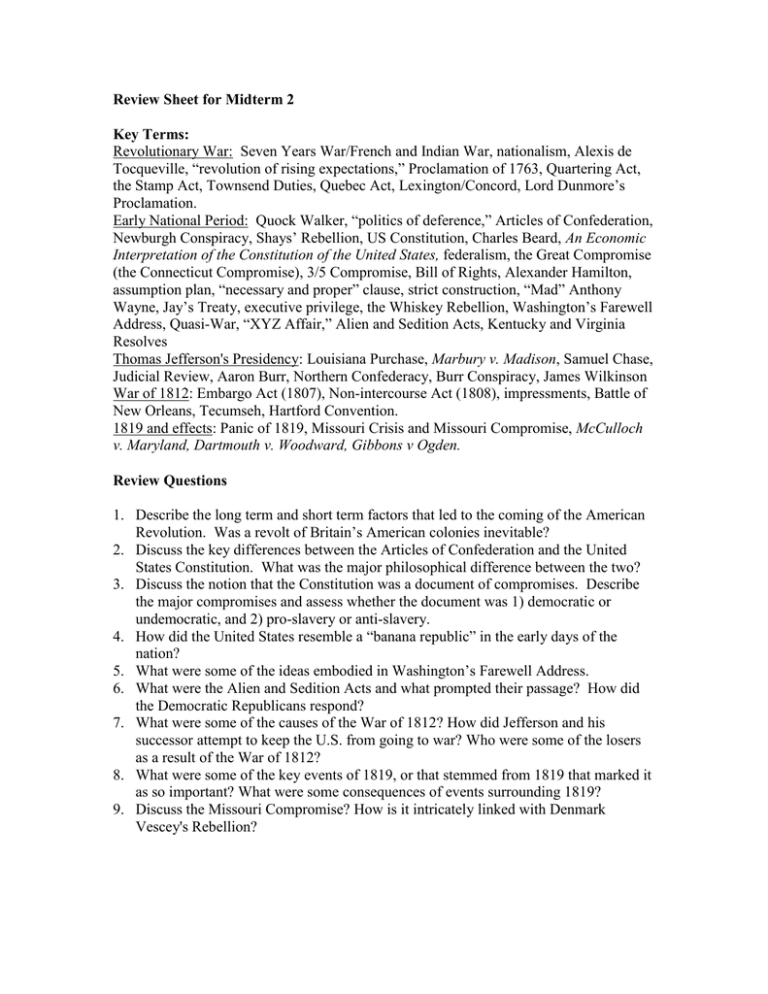
Review Sheet for Midterm 2 Key Terms: Revolutionary War: Seven Years War/French and Indian War, nationalism, Alexis de Tocqueville, “revolution of rising expectations,” Proclamation of 1763, Quartering Act, the Stamp Act, Townsend Duties, Quebec Act, Lexington/Concord, Lord Dunmore’s Proclamation. Early National Period: Quock Walker, “politics of deference,” Articles of Confederation, Newburgh Conspiracy, Shays’ Rebellion, US Constitution, Charles Beard, An Economic Interpretation of the Constitution of the United States, federalism, the Great Compromise (the Connecticut Compromise), 3/5 Compromise, Bill of Rights, Alexander Hamilton, assumption plan, “necessary and proper” clause, strict construction, “Mad” Anthony Wayne, Jay’s Treaty, executive privilege, the Whiskey Rebellion, Washington’s Farewell Address, Quasi-War, “XYZ Affair,” Alien and Sedition Acts, Kentucky and Virginia Resolves Thomas Jefferson's Presidency: Louisiana Purchase, Marbury v. Madison, Samuel Chase, Judicial Review, Aaron Burr, Northern Confederacy, Burr Conspiracy, James Wilkinson War of 1812: Embargo Act (1807), Non-intercourse Act (1808), impressments, Battle of New Orleans, Tecumseh, Hartford Convention. 1819 and effects: Panic of 1819, Missouri Crisis and Missouri Compromise, McCulloch v. Maryland, Dartmouth v. Woodward, Gibbons v Ogden. Review Questions 1. Describe the long term and short term factors that led to the coming of the American Revolution. Was a revolt of Britain’s American colonies inevitable? 2. Discuss the key differences between the Articles of Confederation and the United States Constitution. What was the major philosophical difference between the two? 3. Discuss the notion that the Constitution was a document of compromises. Describe the major compromises and assess whether the document was 1) democratic or undemocratic, and 2) pro-slavery or anti-slavery. 4. How did the United States resemble a “banana republic” in the early days of the nation? 5. What were some of the ideas embodied in Washington’s Farewell Address. 6. What were the Alien and Sedition Acts and what prompted their passage? How did the Democratic Republicans respond? 7. What were some of the causes of the War of 1812? How did Jefferson and his successor attempt to keep the U.S. from going to war? Who were some of the losers as a result of the War of 1812? 8. What were some of the key events of 1819, or that stemmed from 1819 that marked it as so important? What were some consequences of events surrounding 1819? 9. Discuss the Missouri Compromise? How is it intricately linked with Denmark Vescey's Rebellion? Potential Essays 1. Compare and contrast the Articles of Confederation and the US Constitution. At minimum you must assess the branches of government and powers granted to the government. How were the Articles of Confederation a reaction to the Revolutionary War (hint – what kind of government did they fight and what kind of government did they create)? How did the two documents represent different philosophies about government (i.e. – local versus centralized control)? How did the new document represent a pro-slavery bias without ever mentioning the words “slave” or “slavery”? 2. Discuss Thomas Jefferson’s ideologies and his crisis of ideology while president. How did Jefferson’s views on slavery represent a conflict of ideals? What was the doctrine of “strict construction,” and how did Jefferson embrace this philosophy prior to his presidency (think bank issues and the Kentucky and Virginia resolves)? What was the Louisiana Purchase, and how did it represent a potential constitutional crisis, and thus a crisis of Jefferson’s own ideals? How did Jefferson’s “war on the judiciary” simultaneously represent his views on strict construction, and yet ultimately subvert his beliefs about the judiciary? 3. Explain how the political order had changed in the US following the War of 1812. Thoroughly identify the Missouri Crisis, and discuss how it led to significant changes in the U.S. (conceptions about slavery, “gag rule”). Describe how the US annexed Florida, and what lesson the U.S. took from this expansion. What role did it play in the formation of the Monroe Doctrine? Identify the Monroe Doctrine, and demonstrate how it was completely different foreign policy orientation for the U.S. Finally discuss the political implications of the Second Great Awakening (concrete nature of sin, nations commit sins and thus share in the punishment), and describe how the new found religious sense represented a distinct transformation in the U.S.
